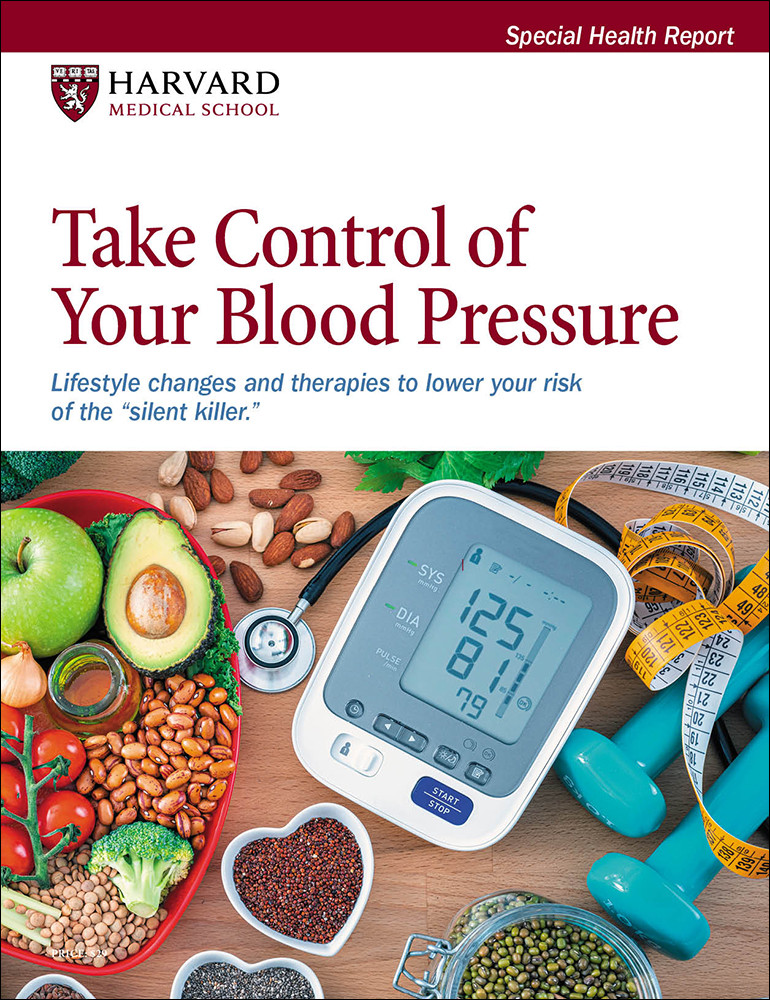The new blood pressure guidelines: What you need to know
Highlights include encouraging earlier drug treatment to preserve heart and brain health, plus advice for stubbornly high blood pressure.
- Reviewed by Christopher P. Cannon, MD, Editor in Chief, Harvard Heart Letter; Editorial Advisory Board Member, Harvard Health Publishing

Has a doctor has ever told you that your blood pressure is a little high — but never prescribed any medication for it? Or maybe you’ve been taking drugs for high blood pressure (hypertension) for years, but still struggle to reach your blood pressure goal. Either way, you’ve got plenty of company. Nearly half of American adults have high blood pressure, defined as 130/80 milligrams of mercury (mm Hg) or higher.
Even if your blood pressure is only slightly elevated (see “Blood pressure categories”), you should be aware of the latest blood pressure guidelines from the American Heart Association and American College of Cardiology, published in the October 2025 issue of the journal Hypertension. They reinforce the importance of getting your blood pressure below 130/80 — and, if needed, taking medications sooner rather than later.
“Many people with high blood pressure want to try diet and lifestyle changes, which doctors should always encourage as the first step,” says Dr. Randall Zusman, director of the Division of Hypertension at the Harvard-affiliated Massachusetts General Hospital Heart Center. But more often than not, those well-intentioned changes don’t go far enough, or the commitment to stick to healthy habits wanes over time. If months or even years go by, blood pressure may continue to creep even higher, he says. “The new guidelines now emphasize starting medication if your blood pressure isn’t below the goal after three to six months of lifestyle changes,” says Dr. Zusman. (For advice, see “5 lifestyle changes to lower blood pressure”).
5 lifestyle changes to lower blood pressureWhat you choose to eat and drink can have a profound effect on your blood pressure. So does how much (and how often) you move your body and relax your brain. Here’s what Harvard hypertension expert Dr. Randall Zusman recommends. 1. Shun salty foods, and toss the saltshaker. “I’m pretty hard-nosed when it comes to cutting down on sodium,” says Dr. Zusman. A main component of salt, sodium is a major contributor to high blood pressure. To eat less, avoid ultra-processed foods (many of which are loaded with sodium) and choose lower-sodium versions of products you eat regularly, such as cereals, soups, and sauces. Instead of salt, use alternative flavor-boosters like garlic, pepper, cumin, or hot sauce, he suggests. 2. Prioritize potassium. Follow a plant-forward eating pattern to get plenty of potassium, a mineral that helps lower blood pressure. Bananas and potatoes are often touted as rich sources of potassium, but they’re higher in calories and carbohydrates than other good sources like tomatoes and broccoli. “Have a handful of cherry tomatoes every day,” Dr. Zusman suggests. A cup of cherry tomatoes has about 350 milligrams of potassium but just 27 calories. 3. If you drink alcohol, do so mindfully. “I don’t tell my patients to abstain from alcohol completely because having too many strict rules can backfire,” he says. But people should always practice moderation (no more than two drinks per day for men and one for women). 4. Emphasize exercise. Physical activity keeps your heart and blood vessels in good working order, which keeps blood pressure down. A combination of heart-pumping aerobic exercise (such as brisk walking, cycling, or swimming) and weight training (using your body weight, resistance bands, or dumbbells) is most effective. Even just a little daily movement helps. Doing 30 minutes or more daily is even better. 5. Practice the relaxation response. Identified in the 1970s by the late Harvard cardiologist Dr. Herbert Benson, this is a state of profound rest that can be elicited in many ways, including meditation, yoga, and progressive muscle relaxation. “My patients often tell me they have a lot of stress in their lives, and I always recommend the relaxation response, which can help you achieve an emotional state linked to lower blood pressure,” says Dr. Zusman. |
How high blood pressure harms your health
Why is high blood pressure so harmful? The persistent pounding of blood against the delicate inner walls of the arteries creates microscopic damage. Fat, cholesterol, and other debris in the blood collect in these rough spots, forming plaque. The arteries then become less flexible, causing them to stiffen rather than stretch, so blood can’t flow as freely. In turn, your heart has to work harder to pump blood throughout your body, causing the heart muscle to thicken.
People with early-stage high blood pressure (Stage 1 hypertension) have double the risk of heart attacks and strokes as people with normal blood pressure. What’s more, high blood pressure is also strongly linked to a higher risk of cognitive decline and dementia, according to the guidelines. “People tend to be more afraid of becoming mentally impaired than having a heart attack. Knowing about this potential risk often motivates them to stick to their treatment program,” says Dr. Zusman.
Healthy lifestyle habits are vital, though most people with high blood pressure also need at least one and sometimes two or three medications to get their readings down to a safe level. If you’re troubled by side effects from a blood pressure drug, know that they often subside or go away within a few weeks. If they don’t, talk to your doctor, as there are many alternatives you can try, says Dr. Zusman.
Blood pressure categories |
|||
|
BLOOD PRESSURE CATEGORY |
SYSTOLIC mm Hg (upper number) |
DIASTOLIC mm Hg (lower number) |
|
|
Normal |
Less than 120 |
and |
Less than 80 |
|
Elevated |
120–129 |
and |
Less than 80 |
|
Stage 1 hypertension (high blood pressure) |
130–139 |
or |
80–89 |
|
Stage 2 hypertension (high blood pressure) |
140 or higher |
or |
90 or higher |
|
Severe hypertension (If you don’t have symptoms,* call your health care professional) |
Higher than 180 |
and/or |
Higher than 120 |
|
Hypertensive emergency (If you have any of these symptoms,* call 911) |
Higher than 180 |
and/or |
Higher than 120 |
*Symptoms: Chest pain, shortness of breath, back pain, numbness, weakness, change in vision, or difficulty speaking
Source: American Heart Association.
New screening and treatment updates
The new guidelines also recommend that everyone with high blood pressure be screened for primary aldosteronism, a condition that occurs when the adrenal glands make too much aldosterone. Overproduction of this hormone — which regulates levels of sodium, potassium, and water in the body — was once considered a rare cause of high blood pressure. Now, aldosteronism is considered a more common and often overlooked cause of high blood pressure. A simple blood test can detect the problem and help your doctor choose more effective drugs and other therapies, says Dr. Zusman.
What if you’re taking three or more drugs (including a diuretic) and your blood pressure is still not under control? Doctors call this resistant hypertension. You may be a candidate for renal denervation, a procedure that reduces blood pressure by disrupting some of the nerves around the arteries supplying blood to the kidneys (see “A non-drug approach to lower blood pressure” in the November 2024 HeartLetter). “While not for everyone, renal denervation can be very effective for some people, who should be carefully screened by a cardiologist familiar with the procedure,” says Dr. Zusman.
Image: © Ridofranz/Getty Images
About the Author

Julie Corliss, Executive Editor, Harvard Heart Letter
About the Reviewer

Christopher P. Cannon, MD, Editor in Chief, Harvard Heart Letter; Editorial Advisory Board Member, Harvard Health Publishing
Disclaimer:
As a service to our readers, Harvard Health Publishing provides access to our library of archived content. Please note the date of last review or update on all articles.
No content on this site, regardless of date, should ever be used as a substitute for direct medical advice from your doctor or other qualified clinician.
















